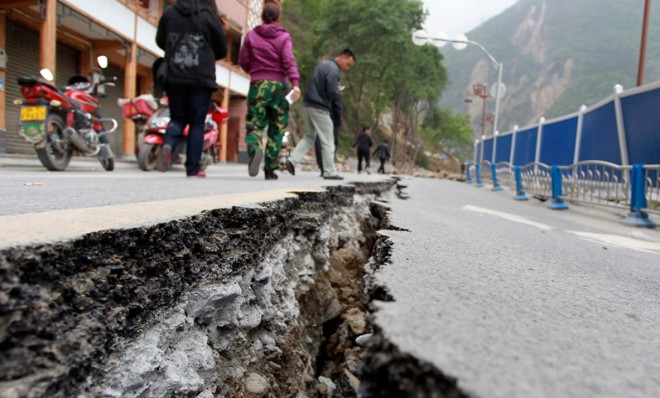China's deadly earthquake problem
Nearly 200 died and more than 11,000 were injured after an earthquake hit Sichuan province

A free daily email with the biggest news stories of the day – and the best features from TheWeek.com
You are now subscribed
Your newsletter sign-up was successful
The aftermath of the 6.6-magnitude earthquake that rocked China's Sichuan province is devastating: 189 dead and more than 11,000 injured. And while that's bad, it's only a fraction of the estimated 80,000 that died after a 7.9-magnitutde quake hit the same region in 2008.
Why does China suffer so many casualties after earthquakes?
As TIME's Bryan Walsh says, human "failures can turn natural disasters into man-made ones — and man-made ones are always worse." Those failures include China's lax building-safety standards, which Luo Shiqiang, a 20-year-old college student whose home collapsed in the earthquake, criticized in an interview with CBS News:
The Week
Escape your echo chamber. Get the facts behind the news, plus analysis from multiple perspectives.

Sign up for The Week's Free Newsletters
From our morning news briefing to a weekly Good News Newsletter, get the best of The Week delivered directly to your inbox.
From our morning news briefing to a weekly Good News Newsletter, get the best of The Week delivered directly to your inbox.
Luo said he wished more had been done to make his community's buildings quake-resistant. "Maybe the country's leaders really wanted to help us, but when it comes to the lower levels the officials don't carry it out," he said. [CBS News]
Shoddy workmanship isn't the only problem. Reuters reports that thousands of earthquake survivors are stranded without food or shelter because many of the roads leading to the province are blocked and damaged. "Supplies have had difficulty getting into the region because of the traffic jams," Kevin Xia, an official with the International Federation of Red Cross and Red Crescent Societies, told Reuters. "Most of our supplies are still on the way."
There is also a disparity between the damage wrought on rural areas and urban centers, which use better construction materials and have stricter building codes. In 2008, The Wall Street Journal compared the utter devastation in rural Beichuan county with the almost complete lack of damage in Chengdu, a city of 10 million people only 55 miles away.
The question is whether Sichuan experienced less fatalities now than in 2008 solely because the earthquake was smaller, or because the Chinese government actually made good on its promise to reinforce the region's buildings. (Furthermore, the earthquake struck on a weekend when children weren't in school, possibly limiting casualties.)
The government's response this time around has been deemed, almost unanimously, as better than it was five years ago. What changed? First, high-profile individuals like artist Ai Weiwei raised a ruckus after thousands of children in 2008 died in what he called "tofu-skin" schools, the result of local officials siphoning money from construction projects. Ai's quest to name every single child who died during the earthquake — which, in a video piece he created, reached 4,851 names — led to worldwide media attention.
A free daily email with the biggest news stories of the day – and the best features from TheWeek.com
And after 2008, Twitter-like social media sites like Sina became wildly popular, allowing citizens to express their outrage over the children's deaths despite state attempts to control the conversation. The result, says The New Yorker's Evan Osnos, was a change for the better:
For all of the devastation in 2008, the legacy of that earthquake was only partly physical. It changed the way many Chinese people talked about government accountability, charity, and citizenship. As China begins to assess the consequences of the 2013 quake, it will be measuring itself in more ways than one. [The New Yorker]
Perhaps most of all, China's ruling class understands that its grip on power is predicated on the government fulfilling certain obligations. The most prominent is economic growth, but environmental protections, a reduction in corruption, and, increasingly, basic safety guarantees have also come to be expected by the Chinese people. For a state in perpetual fear of a democratic uprising, protecting the livelihood of its citizens is one of the most effective ways of keeping dissent in check.
Keith Wagstaff is a staff writer at TheWeek.com covering politics and current events. He has previously written for such publications as TIME, Details, VICE, and the Village Voice.
-
 Political cartoons for February 16
Political cartoons for February 16Cartoons Monday’s political cartoons include President's Day, a valentine from the Epstein files, and more
-
 Regent Hong Kong: a tranquil haven with a prime waterfront spot
Regent Hong Kong: a tranquil haven with a prime waterfront spotThe Week Recommends The trendy hotel recently underwent an extensive two-year revamp
-
 The problem with diagnosing profound autism
The problem with diagnosing profound autismThe Explainer Experts are reconsidering the idea of autism as a spectrum, which could impact diagnoses and policy making for the condition